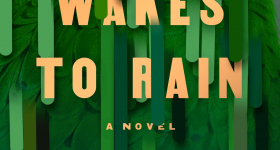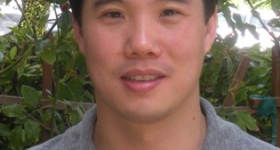For October, we’re excited to bring you an excerpt of Alexandra Kleeman’s debut novel, You Too Can Have a Body Like Mine. A dark satire meditating on everything from television and commercialism to food and body image, Kleeman’s novel will leave you discomforted and disoriented, while enticing you to enjoy the strangeness of the ride.
-- Karissa Chen, Fiction & Poetry Editor
Excerpt of YOU TOO CAN HAVE A BODY LIKE MINE. Copyright © 2015 by Alexandra Kleeman
Reprinted by permission of Harper, an imprint of HarperCollins Publishers
Thumping sounds came from the other side of the bedroom door. It was B moving around our apartment: one small thump from the living room, and another, and then the sound of something being dragged across the floor. I heard her going to start the coffeemaker and then giving up, opening the refrigerator and giving that up, too. Standing still in the middle of my room, I tried to gauge how much I could move without letting her know that I was live. She couldn’t assume that I’d be conscious this early in the morning, but that wouldn’t stop her from checking every five or ten minutes, pausing to listen for the sounds of someone wakeful. Then sometimes she’d sit herself near the door, ear against the doorjamb, and talk toward me as though we were having a normal conversation. She’d talk toward me until I responded. B said the apartment was lonely when I wasn’t awake. She said if I was sleeping, I was as good as dead. She meant in terms of companionship, interactivity, my ability to help her make breakfast for herself. When B did eat, which was not always, she preferred to touch the food as little as possible to keep her hands clear of what she called “that edible smell.” She needed my hands to cut, to squeeze, to handle, to break eggs and toss their slimy shells into the garbage.
B and I were both petite, pale, and prone to sunburn. We had dark hair, pointy chins, and skinny wrists; we wore size six shoes. If you reduced each of us to a list of adjectives, we’d come out nearly equivalent. My boyfriend, C, said this was why I liked her so much, why we spent so much time together. C said that all I wanted in a person was another iteration of my person, legible to me as I would be to myself. When he said this it felt like he was calling me lazy. B and I looked alike, talked alike, that was fair enough. To strangers viewing us from a distance as we wove a confused path through the supermarket hand in hand, we might seem like the same person. But I was on the inside and I saw differences everywhere, even if they were only differences of scale. We looked young, but there was a lost, childish quality to how she slumped over whatever she was doing. We had the same brown eyes, but hers were set deeper in her skull, pushed back so that they disappeared beneath the shadow of her brow. We were thin, but B was catastrophically so: I had helped her zip up a dress, I had held her hair back and rubbed the cool, clammy base of her neck with my fingers as she deposited the contents of her stomach into the sink. I knew how her bones looked and how they felt shifting just below the skin.
Whenever I had something nice to say about her or something mean, C would just shrug his shoulders and say I only thought that because we were too much alike. He had a chronic misunderstanding of me. B was fragile and sick and needed to be nursed. She looked underfed, she touched objects like someone who owned nothing in the world. Sympathy for her transported me out of myself, away from my own problems. She was cut to my shape and size like a trapdoor: similar enough that I could imagine myself into her, different enough to make that fantasy a form of escape.
This morning, though, as I listened to her voice on the other side of the door, I wished that I had worked harder to have our differences. B missed me more the more I saw her. Under her scrutiny I felt the weight of my own presence constantly and grew tired, irritated by myself, so that day by day I waited a little longer before coming out of my room in the morning, trying to postpone reentering the construct of my life. Her affection created in me the wish that she would stop loving me, would leave me alone, would let me feel affection for her the way I did when she first moved in, harmless and sad, when I could feel generous for trying to think about why she was sad and come up with ways to make her happy.
From the hallway outside my bedroom, her mouth close to the sliver of space between door and molding, B spoke—I wanted to make us some coffee, but we’re all out of coffee.
—I need your help to figure out what kind of juice I should drink. What juice has the least free radicals? Does juice have lead in it?
—Have you ever had one of those moles that sticks out? Can you feel with one of those moles that stick out? The way you feel with your fingers and other body parts?
—I had a dream last night that we were both birds with their wings missing, but we helped each other escape from a box. When we escaped we were so happy we wanted to celebrate, but we couldn’t show it. We didn’t have limbs.
THERE’S A COMMERCIAL ON TV where a woman using this new citrus-based facial scrub begins to scratch at the side of her face, discovering that it has edges, shriveled and curling slightly like old paper. Eyeing the camera, she grasps these edges and lifts up on them until she is peeling the whole surface of her face off with a filmy sound like plastic wrap unsticking from itself. Underneath is another face exactly like hers, but prettier. It’s younger and wearing better makeup. You’d think that she might want to stop here and start being happy with herself the way she newly is. But she doesn’t stop: instead, she clutches at the side of her face and begins to peel again, and this time the face underneath is even prettier and she’s smiling wildly at the camera, she’s so pleased.
And she peels again, but this time what’s underneath is a video of the seashore crashing against a sandy beach, and her hand peels it all off again, and we stare into a deciduous forest filtered through by little blades of light and sunshine. Then she turns straight toward the camera and peels her face off from the opposite direction, and the face that’s underneath belongs to the company’s famous actress spokesperson. It’s been her voice all along telling us about the hydrating effects and natural ingredients, the way you’ll love yourself remade. She doesn’t ask what happened to the other woman, the woman who came before her. She smiles beautifully with her hard white teeth. Words appear on the screen: TruBeauty. TruSkin. Your real skin is within.
B wanted to try the product out, she said you could buy it anywhere. But B hated to buy anything herself. She preferred to borrow from someone else, even though her parents had three cars and a horse and sent her checks every month for the rent. If I asked her why she was always trying to need more than she needed, she’d say that borrowing brought you closer to other people, while buying mostly made you lonelier. That was how I ended up going out with B to the all-night Wally’s Supermarket fifteen minutes away on a night when dozens of teenagers hung inexplicably around the parking lot, posed darkly like crows, staring and not saying a thing.










Comments